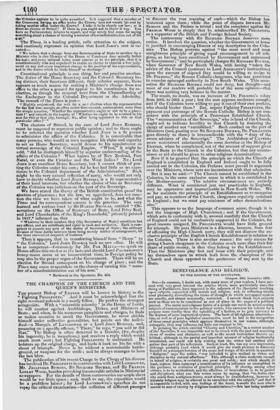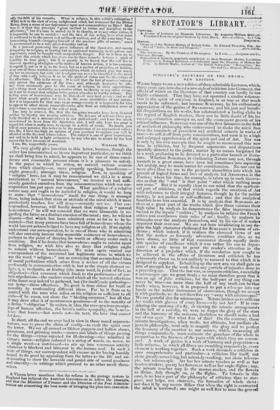BENEVOLENCE AND RELIGION.
TO TUE EDITOR OP TUE SPECTATOR.
Glasgow, 261.11 November 1839.
Ste—In common, I doubt not, with many more of your readers, I have per- used with very great interest the articles which, more particularly since the rising of Parliament, have appeared in the columns of the Spectator touching upon subjects connected with morals and religion, and, to reflecting minds, most pleasantly diversifying the trains of thought to which newspaper-readers
are usually, and almost necessarily, restricted. I cannot think that subjects such as these are to be considered as out of place in the pages of a political journal. The moral and religious habits of a people can never be uninteresting subjects of contemplation to the political writer, who exercises his talents for a purpose more worthy than the upholding of a faction, or to gain currency to the dogmas of some unpractical system. 'The basis of all righteous administra- tion, as well as of pure legislative enactments, must be laid in the recognition of those moral principles which approve themselves to our reason, although, unhappily, they may influence too little our conduct in life. In perusing the article entitled "Charity and Charities," in a recent number of the Spectator, it was impossible not to be struck with the just and searching views of motive and character, as well as the sound instruction therein ex- hibited; although in the partial and imperfect account of religion incidentally introduced, one could not help wishing that the writer had omitted alto. gether that part of his reflections. Such at least, Sir, was my own impression, although probably (and which it would give me much pleasure to discover) founded on a misapprehension of the scope and design of the article in question. " Religion," says the writer, "was intended to give method to virtue and discipline to the natural affections." This, although a claim moderate enough in behalf of religion, is certainly one great and noble ; and which should, at least, redeem from contempt a consideration of its influence as exemplified in the guidance or evolution of practical principles. If charity, among other. virtues, is to be methodized, and the affection of benevolence is to be guided and disciplined, what can this writer mean by saying, that "to derive cha- rity solely from a religious einitee, must always be unsatisfactory, however in- timately religion may be allowed to he connected with the subject," and that it is impossible to fed, with any feelings of the heart, towards the man wiai is moved to sets of charity by religious eonsiderations?—this last being undoubt-
,
caly tho•drift of his remarks. What' is relyert;in thia.writer's estimation? What isit in the view of 'every enlightened mmti, but reverence for the Bing,:frOm a sense of our dependence Upon and'accountability t6 Iihn ? Mott true d is that this principle gives method to virtue and discipline. to the affections ;" 'but if a man is moved by, it to .charity, or to any other virtue, it is impossible he can be mistaken : end the ,idea of one acting from what must beeonfessed to he the purest and stiblimest motives, and at the sometime Sr un- humanizing himself—stripping himself of the gracious gifts of nature," must be pronounced to be a very great absurdity indeed. In a journal possessing the great influence of the Spectator, statements derogatory to religion, or bearing but an equivocal testimony to its nature and importance, must be 'fraught with unspeakable danger. Far be it from me to SCV that the article which has ziven rise to these remarks Iwtraxs h spirit of hustility to true piety : but it is greatly to be feared that the evil lies in this—in speaking of raigion as the motive of human action, it is too common to regard it, not as it is in the heart, but as a matter of prejudice, or fashion, or as one of those worthless conventionalities which do indeed give too much the law to conduct, but with whivb religion can never be identihed in the iii 01 of him who really believes it to be the guide of virtue and the discipliner of the affections. This is far wrong. It is said that the fact of spurimm coinage only proves the existence a the true; and, although hypocrisy be rife, 'and what commonly goes by the name of religion bc mere superstition, and a thing most unworthy as n motive either to charity or any other virtue, Jet it not be denied that religion is the purest stimulus to worthy actions. The ic.ling even of benevolence may he abused—it may lead astrov ; and we all ham- what unsafe guides we have in the mere sensibilities Of our nature. Bat it is impossible for that man to go wrong—serely it is impossible for him to appear to other minds unamb-thle—who acts from an enlightened sense of dutv—from a conviction of the 1011 of God. l'oa may be assured, Sir, that the foregoing remarks have been dictated neither by bigotry nor carping criticism. illy defence of relkion (here fro- bobly founded on a misconception) is not professional : mad 1 am too much accustomed to learn from the Spectator, and, I will add, have too great a regard for what is really true, to engage in a strife of words. No doubt, you
will at once perceive this letter to be 'the production of an unpractised writer ; but, Sir, I have too high an opinion of your candour to suppose you will be oftmded at the freedom Howe taken. Tile subject is one of great importance, and not to be held in light estimation by any who aim to secure by the best means the best interests of mankind.
I am, Sir, respectfully yours, WILLIAM
We very gladly give insertion to this letter, because, though the writer has misconceived us in one important particular, as we think we shall bring him to admit, he appears to be one of those consi- derate and reasonable persons whom it is a pleasure to satisfy. In the paper to which he refers, we noticed various sources from which charity—or, more properly speaking, beneficence— might proceed ; amongst these, religion. Now, in speaking of " religion" here, (as it may be remembered we did,) in a sense antithetical to " natural benevolence," we trusted we had suffi- ciently guarded ourselves from the misconstruction which our cor- respondent has put upon our words. What qualities of a relative nature may and ought to be included in religion, it would be long to state : that " benevolence" itself, for one thing, is amongst them, being indeed that state or attitude of the mind which it most particularly teaches, few will deny—certainly not we. Our cor- respondent, however, will hardly assert that religion is " natural benevolence ;" he will not contend that we were blameable in re- garding the latter as a distinct emotion of the mind ; nay, he will not dispute—that which has been admitted even so far as to be la- mented—that many persons have been full of benevolence whom the world has not acknowledged to have any religion at all. If we rightly understand our correspondent, he is one of those who in admitting will also certainly lament this separable existence of benevolence ; perhaps to the point of denying its worth or efficacy under such a condition. But if he denies that benevolence ought to subsist apart from religion, we wish him also to deny that religion ought to subsist without benevolence. We must again remind our correspondent of the restricted but legitimate sense in which we use the word " religion :" not as conveying that accumulated idea of moral perfections which arises from a review of all the virtues professedly in communication with it, but as the simple abstract re- q. e. re-ligatio, or binding (time same word, in point of fact, as obligation)—that covenant which binds to the performance of cer- tain stipulations—the nucleus round which all the natural affections ofthe heart may indeed be gathered, but Ow itself) only gathering— not being—those affections. No good is done either for truth or morality by confounding different ideas. Far be it from us to quarrel with the man who relies on his religion as sufficient to all ends—if he mean, not alone the " binding covenant," but all that it may draw after it of spontaneous goodness—if to the sanctity of it divine " obligation " he unites, in idea, the ever-gracious prompt- ings of human affection, the heart's native sympathy, the benevo- lence that knows—but needs not—its text, the love that cannot hut love.
In short, all the end we ever had in view in these moral argumen- tations, was to press the claim of reality—to exalt the spirit over the letter. We see all around us lifeless puppets and hollow shows, phantoms, and grinning masks—names and labels of things passing Thr the things—virtue rejected for ill-dressing—vice admitted in virtue's name—religion reduced to a string of words, or, worse, to a single word—a watchword—to stir up into venomons activity whatever is blackest and bitterest in the human soul. In such a state of things, our correspondent will excuse us for having humbly hoped to do good by appealing from the letter to the life and en- deavouring to show the loveable and genial side of moral goodness and sincerity—in writings which pretend to no other merit them- selves.



























 Previous page
Previous page